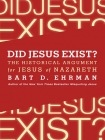Did Jesus Exist? - The Historical Argument for Jesus of Nazareth by Bart Ehrman (ebook reader browser .TXT) 📗

- Author: Bart Ehrman
Book online «Did Jesus Exist? - The Historical Argument for Jesus of Nazareth by Bart Ehrman (ebook reader browser .TXT) 📗». Author Bart Ehrman
Here again defenders of Jesus’s historicity point out that Paul on several occasions does appear to quote Jesus (for example, 1 Corinthians 11:22–24). Some mythicists argue that these quotations, like those of Josephus, were not originally in the writings of Paul but were inserted by later scribes. Other mythicists argue that Paul is not quoting the words of the historical Jesus but is quoting the words the heavenly “Jesus” has spoken through Christian prophets in Paul’s communities. For both kinds of mythicist, Paul did not know or think about a historical person Jesus. For him Christ was a heavenly being of mythical proportions. How, you might wonder, could a nonhistorical person die? Mythicists have an explanation for that too, as we will see. For now it is enough to know that they generally insist that Paul did not refer to the historical Jesus, and they point out that this would be very strange if in fact he knew that he existed. The same can be said of the other writings of the New Testament, outside the Gospels.
This means that Matthew, Mark, Luke, and John are our only real sources for knowing about the historical Jesus, and mythicists find these four sources highly problematic as historical documents. For one thing, they were written near the end of the first century at best, four or five decades or more after Jesus allegedly lived. If he really did live, wouldn’t we have some earlier sources? And how can we rely on such hearsay from so many years later?
Moreover, mythicists typically point out that the Gospels cannot be trusted in what they do say. Their many accounts of what Jesus said and did are chock-full of contradictions and discrepancies and so are completely unreliable. The Gospels are thoroughly biased toward their subject matter and so do not present anything like disinterested history “as it really was.” They can be shown to have modified the stories they relate, and in some places they obviously have made up stories about Jesus. In fact, virtually all—or even all—of the stories may have been invented. This is especially the case with the so-called miracles of Jesus, narrated by the Gospel writers to convince others to believe in him but incredible to the point that, well, they are literally incredible—not to be believed.
Furthermore, many mythicists insist that the four Gospels ultimately all go back to just one of the Gospels, Mark, on which the other three were based. This means that of all the many writers—pagan, Jewish, and Christian—that we have from the first century (assuming Mark was written as early as the first century), we have only one that describes or even mentions the life of the historical Jesus. How plausible is that, if Jesus actually lived?
Given all these problems, some mythicists insist that the burden of proof rests on anyone who wants to claim that Jesus did in fact exist. Added to these negative arguments is one very important positive one, that the stories about Jesus—many of them incredible, all of them based on late and unreliable witnesses—are paralleled time and again in the myths about pagan gods and other divine men discussed in the ancient world. And so mythicists typically appeal to accounts of other gods or demigods, such as Heracles, Osiris, Mithras, Attis, Adonis, and Dionysus, who were said to have been born on December 25 to a virgin mother, to have done miraculous deeds for the sake of others, to have died (often for the sake of others), and to have been raised from the dead and later departed to live in the divine realm.
I have already said a few words about such claims, and we will examine them in greater detail at a later point. For now it is enough to stress that mythicists make a two-pronged argument: given the negative argument, that we have no reliable witness that even mentions a historical Jesus, and the positive one, that his story appears to have been modeled on the accounts told of other divinities, it is simplest to believe that he never existed but was invented as another supernatural being. In this reading of the evidence, Christianity is founded on a myth.
Before countering the claims of the mythicists, I will set out the evidence that has persuaded everyone else, amateur and professional scholar alike, that Jesus really did exist. That will be the subject of the next several chapters.
CHAPTER TWO
Non-Christian Sources for the Life of Jesus
IAM EXPECTING TO GET a very different reaction from this book than from others I have written over the years. Typically, but to my honest surprise, I get accused—or thanked, depending on who is writing me—of being anti-Christian because of the things I say in my books. I find this surprising because I don’t consider myself anti-Christian. When I tell people this, I often get a disbelieving response: of course you’re anti-Christian. Look at all the ways you attack Christianity!
But I have never seen it this way. In my view, the only thing I attack in my writings (and not even directly) is a fundamentalist and conservative evangelical understanding of Christianity. But to say for that reason that I attack Christianity is like saying that if you don’t like raspberry sherbet you don’t like any kind of ice cream. You can make the case (and you would be right) that sherbet isn’t ice cream at all, so not liking it has nothing to do with ice cream. But even if you think sherbet is close enough to ice cream that you may as well call it ice cream, by saying you don’t like raspberry sherbet you’re simply saying that there is one flavor of it you would rather not eat, given the choice.
I certainly do not mean to say that I consider myself either a





Comments (0)